Best Colleges for Sleep

Ask the average college student how much sleep they get per night, and they’ll laugh. With increased academic pressure, labs and exams to prepare for, roommate life, and unlimited freedom to enjoy social activities, there is little room for sleep.
Stress, insomnia, and the demands of academic life make sleep elusive for many college students. It couldn’t come at a worse time. College students need 8 hours of sleep, but fewer than a third of them are getting it on a regular basis.
How can we help students get more sleep? Fortunately, several colleges across the country are rising to the challenge.
Keep reading to learn about the sleep issues affecting college students and discover the top colleges for sleep. Our guide will help you find the best pro-sleep college for you, and offer tips for sleeping well once you arrive.
Sleep deprivation and college students
Americans on the whole are sleep-deprived, but the most sleep-deprived are young adults. According to a 2013 Gallup poll, nearly half of adults aged 18 to 29 get less than 6 hours of sleep on a regular basis, and just as many acknowledge they would feel better if they got more sleep.
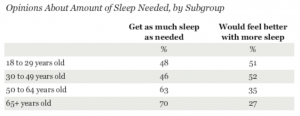


The sleep deprivation trend continues once they reach college. Research in 2014 by the University of St. Thomas found that first-year college students go to sleep on average 75 minutes later than they did in high school, and the contrast between their weekday and weekend schedules creates a “social jetlag” effect similar to flying across the country.
In a 2009 study by the same research team, 20% of students report being unable to sleep at night due to stress about life and school, and only one-third actually get their essential 8 hours of sleep per night. Another 20% reported pulling an all-nighter at least once a month, 35% frequently stayed up until 3am once a week or more, and 12% reported falling asleep in class or missing class altogether due to oversleeping.
Insomnia – difficulty falling or staying asleep – appears to be part and parcel of the college experience. To keep up, students are prone to turn to caffeine and energy stimulants to stay awake, or alcohol and sedatives to fall asleep. Over time, this behavior leads to dependence, addiction, and more sleep and health issues:
- Insomnia and depression are co-morbid, meaning that they often exist together and can worsen or induce symptoms of the other.
- Sleep deprivation is also linked to weight gain, exacerbating the already common “freshman 15.”
- If sleep problems are not managed, students may even develop delayed sleep phase syndrome (DSPS). People with DSPS have a significantly delayed sleep schedule. The more you push sleep off each night, the more your schedule shifts, until you find yourself falling asleep in the middle of the night and waking up at noon.
How sleep (or lack of it) impacts academic performance
A 2014 review of college students and sleep revealed that 50% experience daytime sleepiness and 70% aren’t getting enough sleep. The kind of chronic sleep deprivation college students experience puts their academic performance, overall health and well-being, and even lives at risk. Sleep-deprived students are likelier to have lower GPAs, fail out of school, develop depression and anxiety disorders, and get in a car accident.
Sleep deprivation affects your cognitive processing, memory consolidation, and focus and concentration. Without enough sleep, you’ll have a harder time processing the information you’re learning, committing it to memory, and focusing during study session and exams. Unfortunately, having your mind in tiptop shape is essential for good academic performance. After all, the whole point of being at college is to learn.
Sleep deprivation also weakens your immune system, making you more prone to catching sicknesses that are floating around your dormitory from living in close quarters with other people. The sicker you are, the more classes you have to miss, making it even harder to keep up with your assignments.
Let’s not forget about all-nighters. Bolstered by energy drinks and caffeine, stress and anxiety fuels your adrenaline through the night. Even though you might be fine the next day, your reaction time is worsened. Over the next 2 to 3 days, you can expect to feel more irritable, less focused, and generally exhausted.

When it comes to sleep, the stack is decked against college students. It’s rare for them to get enough sleep, even though the vast majority are aware that better sleep helps them perform better at school.
The best colleges for sleep
In 2016, fitness wearable products company Jawbone analyzed 3 years of data from 18,500 college students at 137 schools across the U.S. They found that students slept fewer than 7 hours on nearly half (46.2%) of the nights included in the study.

Jawbone also noted an interesting trend: the more prestigious the school (the higher their ranking in U.S. News & World Report’s 2016 College Rankings), the later the students went to sleep, lending to the theory that there’s a link between being a night owl and intelligence (finally, some good news for night owls!).
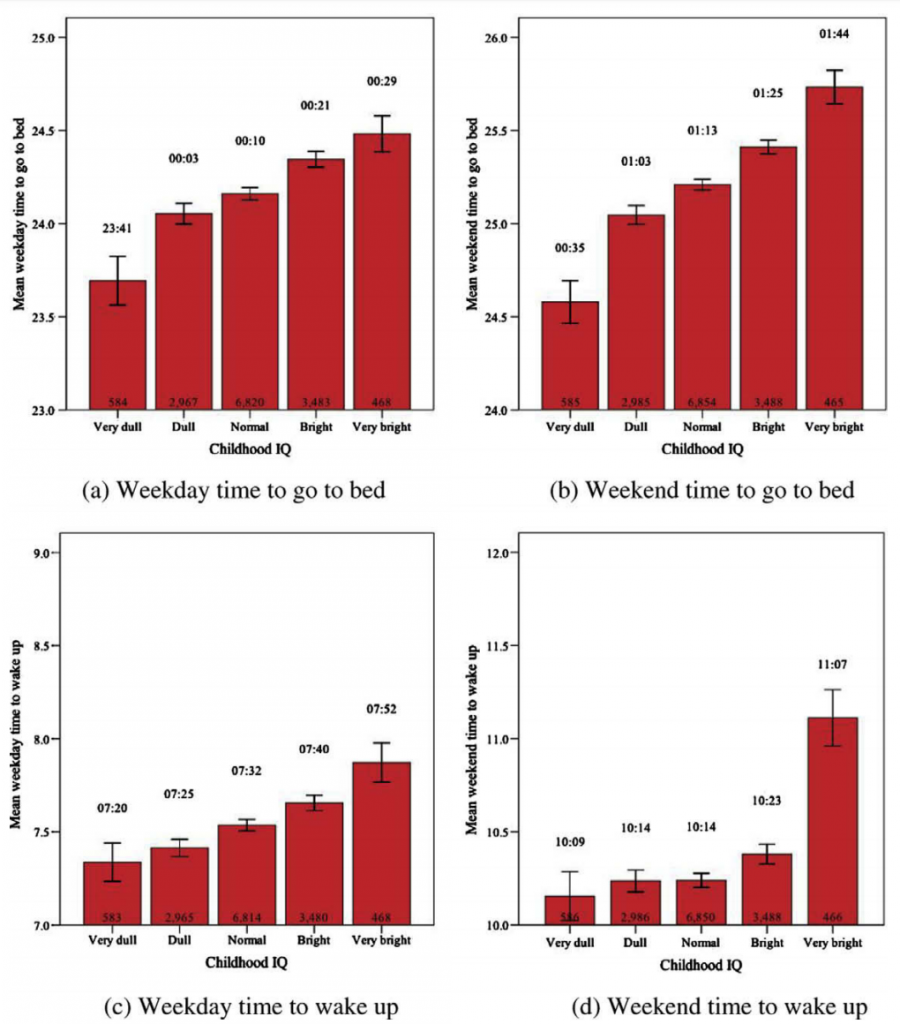
The ones bottoming out Jawbone’s list were Case Western Reserve University starting at 6.71 hours, University of Notre Dame, Columbia University, Air Force Academy, and the Army, Navy, and Coast Guard at a mere 6.38 hours. But you’re here to learn about the winners.
Top Ten Colleges for Sleep in the U.S.
Without further ado, the top ten best colleges for sleep in the U.S. are…
1. University of New Hampshire
At 7.33 hours slept per night, UNH boasts the highest amount of shuteye on average. Plus, the college offers a sleep wellness program and the state has a lower than average obesity rate.
2. Cambridge College
Cambridge College comes in at a close second, with 7.25 hours slept per night. Moreover, the city on the whole has a lower-than-average sleep deprivation rate, and Massachusetts has a low obesity rate as well.
3. University of Oregon
While the University of Oregon is located in one of the most polluted cities in America, students still manage to fit in 7.23 hours of sleep per night. If they have sleep problems, they can participate in the school’s wellness program or check out the sleep center. Eugene also has a much lower-than-average sleep deprivation rate.
4. University of San Diego
Like Oregon, USD students get in a good amount of sleep, despite living in the polluted airs of San Diego. However, California as a state is fit, with only 24.2% of residents qualifying as obese. Also helping matters is the city’s low commute time at 23 minutes on average.
5. University of Colorado
Students at the University of Colorado’s Denver campus have no problem fitting in sleep as part of an overall healthy lifestyle. The city has an extremely low sleep deprivation rate, and state obesity rates are even lower. Denver may be one of the most polluted cities in America, but at least it’s easy to get around with below-average commute times.
6. University of Nevada Reno
UNR students enjoy 7.21 hours of sleep per night, and the rest of Reno is less sleep-deprived on average, too. If any sleep issues arise, students can find relief through the school’s student health center or at one of their sleep medicine centers located throughout Nevada.
7. Tulane University
The Big Easy residents may not sleep so easy, but at least Tulane University students do. Students enjoy living in one of the Cleanest Cities in America and have access to a sleep research center.
8. University of Vermont
Vermont students get 7.2 hours of sleep per night, but don’t expect to hear much snoring on campus, since Burlington is one of the Cleanest Cities in America and the school operates a sleep medicine center. The state also boasts low sleep deprivation and obesity rates.
9. DePaul University
Chicago has above-average sleep deprivation and commute times, and more Illinois residents tend to be obese than the national average. Yet, against all the odds, DePaul students are able to clock 7.17 hours of sleep per night.
10. Auburn University
Auburn University is located in one of the Cleanest Cities in America. Students enjoy 7.17 hours of sleep a night, and if they run into any issues, a sleep disorders center is nearby.
If your college didn’t make the top ten, we’ve also listed out the top 50 below, in order of average hours slept per night.
| School | Hours Slept | City Sleep Deprivation Rate | City Air Quality | City Commute Time | State Obesity Rate | College Sleep Focus |
|---|---|---|---|---|---|---|
| University of New Hampshire – Durham, NH | 7.33 | 26.3 | Wellness Program | |||
| Cambridge College – Cambridge, MA | 7.25 | 33.5 | 24.3 | |||
| University of Oregon – Eugene, OR | 7.23 | 31.4 | Most Polluted City | 30.1 | Sleep Center, Wellness Program | |
| University of San Diego – San Diego, CA | 7.22 | 34.6 | Most Polluted City | 23 | 24.2 | |
| University of Colorado – Denver, CO | 7.21 | 28.1 | Most Polluted City | 24.6 | 20.2 | Sleep Center |
| University of Nevada Reno – Reno, NV | 7.21 | 33.7 | Most Polluted City | 26.7 | Sleep Center, Wellness Program | |
| Tulane University – New Orleans, LA | 7.2 | 38.5 | Cleanest City | 36.2 | Sleep Center | |
| University of Vermont – Burlington, VT | 7.2 | 28.7 | Cleanest City | 25.1 | Sleep Center | |
| DePaul University – Chicago, IL | 7.17 | 37.4 | 30.8 | 30.8 | ||
| Auburn University – Auburn, AL | 7.17 | Cleanest City | 35.6 | Sleep Center | ||
| American University – Washington, DC | 7.16 | 35.2 | 32.8 | 22.1 | Wellness Program | |
| University of Arkansas – Fayetteville, AR | 7.15 | 33.5 | Cleanest City | 34.5 | Wellness Program | |
| University of South Carolina – Columbia, SC | 7.14 | 40.9 | Cleanest City | 31.7 | Sleep Center | |
| University of Iowa – Iowa City, IA | 7.14 | 27.4 | Cleanest City | 32.1 | Sleep Center, Wellness Program | |
| Brown University – Providence, RI | 7.13 | 42.4 | 24.5 | 26 | Sleep Center, Wellness Program | |
| Florida State University – Tallahassee, FL | 7.13 | 36.6 | Cleanest City | 26.8 | ||
| University of South Florida – Tampa, FL | 7.13 | 37.9 | Cleanest City | 24.5 | 26.8 | Sleep Center, Wellness Program |
| Clemson University – Clemson, SC | 7.13 | 31.7 | Wellness Program | |||
| The College of William and Mary – Williamsburg, VA | 7.12 | Cleanest City | 29.2 | |||
| Wake Forest University – Winston-Salem, NC | 7.12 | 36.3 | Cleanest City | 30.1 | Sleep Center, Wellness Program, Nap Facilities | |
| Miami University – Oxford, OH | 7.12 | 29.8 | Wellness Program | |||
| University of Kentucky – Lexington, KY | 7.12 | 37.4 | Cleanest City | 34.6 | Sleep Center | |
| Oregon State University – Corvallis, OR | 7.12 | 30.1 | Wellness Program | |||
| University of Mississippi – University, MS | 7.12 | 35.6 | Sleep Center | |||
| Boston College – Chestnut Hill, MA | 7.11 | 24.3 | Wellness Program | |||
| University of Delaware – Newark, DE | 7.11 | 29.7 | ||||
| University of Utah – Salt Lake City, UT | 7.11 | 32 | Most Polluted City | 24.5 | Sleep Center, Wellness Program | |
| University of Nebraska – Lincoln, NE | 7.1 | 30.7 | Cleanest City | 31.4 | Sleep Center | |
| University of Wisconsin Madison – Madison, WI | 7.08 | 30.3 | 30.7 | Sleep Center, Wellness Program | ||
| University of Denver – Denver, CO | 7.07 | 28.1 | Most Polluted City | 24.6 | 20.2 | |
| University of Virginia – Charlottesville, VA | 7.06 | Cleanest City | 29.2 | Sleep Center | ||
| University of Dayton – Dayton, OH | 7.06 | 45.7 | 29.8 | |||
| Villanova University – Villanova, PA | 7.06 | Most Polluted City | 30 | Wellness Program | ||
| Saint Louis University – Saint Louis, MO | 7.06 | 32.4 | Sleep Center | |||
| Stony Brook University – Stony Brook, NY | 7.04 | 25 | Sleep Center | |||
| Dartmouth College – Hanover, NH | 7.04 | 26.3 | Wellness Program | |||
| George Washington University – Washington, DC | 7.04 | 35.2 | 32.8 | 22.1 | Sleep Center | |
| North Carolina State University – Raleigh, NC | 7.04 | 31.7 | 30.1 | |||
| University of Pittsburgh – Pittsburgh, PA | 7.03 | 40.5 | Most Polluted City | 25 | 30 | Sleep Center |
| University of Connecticut – Storrs, CT | 7.03 | 25.3 | Sleep Center | |||
| California Polytechnic State University – San Luis Obispo, CA | 7.03 | Cleanest City | 24.2 | Wellness Program | ||
| University of Cincinnati – Cincinnati, OH | 7.03 | 38.9 | Most Polluted City | 23.2 | 29.8 | Sleep Center, Wellness Program |
| Harvard University – Cambridge, MA | 7.02 | 33.5 | 24.3 | Sleep Center, Wellness Program | ||
| Oklahoma State University – Stillwater, OK | 7.02 | 33.9 | ||||
| San Diego State University – San Diego, CA | 7.02 | 34.6 | Most Polluted City | 23 | 24.2 | Wellness Program |
| Marquette University – Milwaukee, WI | 7.02 | 40.8 | Cleanest City | 22.3 | 30.7 | Wellness Program |
| Yale University – New Haven, CT | 7.01 | 42.6 | 25.3 | Sleep Center | ||
| Tufts University – Medford, MA | 7.01 | 24.3 | Sleep Center, Wellness Program | |||
| University of Florida – Gainesville, FL | 7.01 | 36.2 | Cleanest City | 26.8 | Sleep Center | |
| Texas Christian University – Fort Worth, TX | 7.01 | 36.1 | Most Polluted City | 25.5 | 32.4 | Wellness Program |
| University of Alabama – Tuscaloosa, AL | 7.01 | 41.4 | Cleanest City | 35.6 | Sleep Center, Wellness Program | |
| Georgetown University – Washington, DC | 7 | 35.2 | 32.8 | 22.1 | Sleep Center | |
| Michigan State University – East Lansing, MI | 7 | Cleanest City | 31.2 | Sleep Center, Wellness Program | ||
| West Virginia University – Morgantown, WV | 7 | 35.6 | Sleep Center, Wellness Program |
Our methodology
Wondering how we found our winners? For our ranking of the Best Colleges for Sleep, we pulled the schools from the Jawbone survey where students slept at least 7 hours a night on average. Then we factored in additional information that speaks to the overall health of the school’s location, such as sleep deprivation and obesity rates, air quality, and average commute times in the city. We also looked into whether the school is taking the initiative to promote better sleep for its students, such as through wellness programs or sleep research.
Sleep deprivation
35.2% of Americans get fewer than 7 hours of sleep on a regular basis, according to the CDC. Schools located in the southeast and Appalachia tend to be in cities with higher rates of sleep deprivation and obesity.
Obesity
We included obesity as an indicator of overall health, which is tied to sleep. Obesity is also a contributing factor to sleep apnea, a condition where an individual literally stops breathing momentarily during sleep, causing disrupted sleep and sleep deprivation. The national average obesity rate is 28.9%.
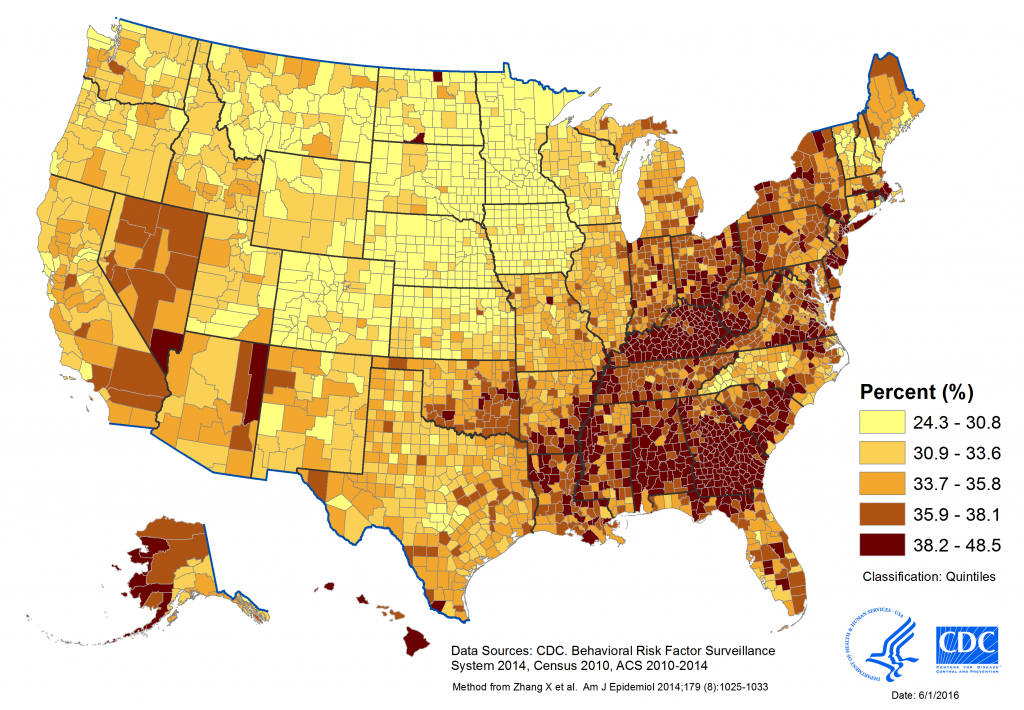
Air Quality
Speaking of sleep apnea, students who snore are at a higher risk for sleep apnea. If they have allergies or live somewhere with air pollution, it’s even harder to breathe at night. Each year, the American Lung Association announces the 25 cleanest cities and the 25 most polluted cities in America. We included this data in our rankings.
Commute Times
If you plan on living off-campus, you’ll also want to take a look at the commute times for your city. People with shorter commutes tend to be happier, and less likely to have diabetes or depression (both of which contribute to insomnia). The commute times from our survey are taken from real estate website Trulia.
How to find your best college for sleep
Of course, those are just our ratings for the best colleges for sleep – and sleep alone. The particular college that will be the best fit for you depends on a variety of factors, including sleep. As you evaluate potential schools, answer the following questions to choose a college that will make getting good sleep a bit easier.
Where is it located?
As you saw from our methodology, several factors determine whether an environment is conducive to sleep. Is your school located in a noisy urban area, or a quiet rural one? What’s the air quality like? Do people follow an active lifestyle there?
Choose a school located in a healthy city that’s good for sleep. Learn more in our Best and Worst Cities for Sleep.
What’s your major?
When it comes to sleeping better in college, one survey suggests the answer may be as simple as choosing the right major. According to a survey of 1,200 students who self-reported their sleep habits, some majors are prone to sleep more than others.
The top three majors with the best sleep (7 hours or more) are public relations, urban planning, and physical education. On the opposite end of the spectrum, the worst three majors for sleep are advertising, foreign languages, and animal science (at an appalling low 4.9 hours per night on average).
Are there napping facilities on campus?
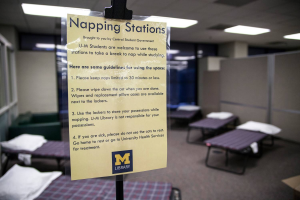 In response to the epidemic of poor sleep, many colleges are creating nap rooms on campus. These facilities often ban the use of electronics in the area, and offer comfortable recliners, bean bags, cots, or other comfy places for sleep. Learn more at the links below:
In response to the epidemic of poor sleep, many colleges are creating nap rooms on campus. These facilities often ban the use of electronics in the area, and offer comfortable recliners, bean bags, cots, or other comfy places for sleep. Learn more at the links below:
- Wake Forest University’s ZieSta Room
- James Madison University Nap Nook
- University of Michigan at Ann Arbor Napping Station
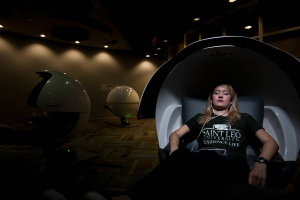 Other schools have shelled out big bucks for specialized Nap Pods, including Savannah College of Art and Design, Texas A&M University, and Saint Leo University, University of Miami, Carnegie Mellon University, California State University Northridge, Wesleyan University, and Washington State University.
Other schools have shelled out big bucks for specialized Nap Pods, including Savannah College of Art and Design, Texas A&M University, and Saint Leo University, University of Miami, Carnegie Mellon University, California State University Northridge, Wesleyan University, and Washington State University.
In the absence of special nap facilities, students can find the quietest spots to snooze in Google nap maps for University of Texas at Austin, UC San Diego, UC Davis, UC Santa Barbara, and Macalester College.
Does the school perform sleep research?
Much of the cutting-edge research being conducted around sleep comes from universities, from on-campus sleep laboratories and research centers manned by faculty and graduate students.
If you attend one of these universities, you’ll have better access to sleep doctors and specialists who know how to diagnose sleep disorders. You may even be able to participate in a study!
- Harvard Medical School’s Division of Sleep Medicine
- Georgetown University’s Sleep Disorders Center
- University of Michigan Sleep Disorders Center
- Stanford Center for Sleep Sciences and Medicine
- University of Rochester Sleep & Neurophysiology Research Laboratory
- University of Miami UHealth Sleep Center
- University of Pennsylvania Center for Sleep and Circadian Neurobiology
- Rush University Sleep Disorders Service and Research Center
- Northwestern University Center of Circadian and Sleep Medicine
- University of Utah Sleep Wake Services
- Augusta University Sleep Center
- University of Mississippi Medical Center Sleep Medicine
- Emory University Sleep Center Core Research Sleep Laboratory
- University of Iowa Sleep Disorders Clinic
- University of Washington Medicine Sleep Center
- University of Maryland Sleep Disorders Center
- University of Chicago Sleep Disorders Center
- George Washington University Sleep Center
- Brown University Alpert Medical School Sleep Medicine
- University of Oregon Sleep Lab
- University of California San Diego Sleep Medicine Center and Sleep Research Laboratory
- University of Colorado Sleep Medicine
- University of Alabama Sleep Research Project
Are there sleep-focused wellness programs?
Even if your school doesn’t have a sleep center, many schools offer educational events and wellness programs around sleep, as well as counseling through the mental health center.
For example, the University of Alabama’s Sleep More, Stress Less program teaches students about creating healthy sleep habits and stress management techniques. At UCLA, the Mind Well Initiative hosts events focused on better sleep, ranging from meditation classes to Sleep Weeks.
Tips for sleeping well in college
Finding a sleep-healthy college is only the first part. The next part is figuring out how to sleep well once you get there. Follow these tips for success.
1. Stick to a firm sleep schedule.
Create a sleep schedule, and stick to it, even on weekends, during finals, and despite the occasional hangover. Go to bed and wake up at the same time every day. Leave room for you to conceivably get at least 8 hours of sleep. Whether you end up spending all of it asleep is a different matter, but the point is to train your brain to learn and differentiate when it’s time to sleep and when it’s time to be awake.
Consistency is more important than going to bed at the “right time.” In 2017, a small study of 61 Harvard students found a strong correlation between consistent sleep patterns and better grades. The researchers also found that the students with irregular sleep and poorer grades had delayed melatonin production, by about 3 hours, creating an effect similar to jet lag. Intriguingly, the researchers found that sleep consistency, versus bedtime, was more important to sleep. If a student was a night owl and went to bed at 1am every night, it didn’t affect their grades as long as they were consistent and still got sufficient sleep. In the graph below, SRI refers to sleep regularity index.

2. Avoid all-nighters and naps if possible.
All-nighters destroy your focus and sleep. While napping is common, reported by a third to half of college students, it can mess with your sleep, too. If you’re excessively tired, aim to nap in the early afternoon or earlier, and limit it to a power nap of 30 minutes or less. Otherwise you could enter deep sleep and wake up even drowsier than before.
3. Make your bed comfy.
Good sleep comes easier on a good mattress. Find the right mattress for you based on your preferred sleeping position (back, side, or stomach), weight, and any health considerations like back pain.
If your college provides a mattress with your room, here’s how you can make that a bit more comfortable.
4. Follow good sleep hygiene.
Good sleep hygiene includes keeping your bedroom dark and cool, turning off all electronics before bed, and using your bedroom only for sleep and sex. For most living in a dorm environment, you may not have control over all of those factors (since your bed is often in the same room as your desk), but there are still things you can do to make your room a better sleep environment.
Do not work in bed. Turn off your electronics 30 minutes before bed, and don’t sleep with your phone. Get blackout curtains for your window (and open them up in the morning upon waking for an extra energy boost). Use an eye mask and earplugs if you have a roommate with a later bedtime or live in a noisy hall.
5. Create a short bedtime routine.
Since you have to turn off your electronics and close the textbooks 30 minutes before bed, you need something else to do in the meantime. Try reading a calm story or listening to an audiobook. Take up meditation or some light yoga. Visualize how well you’ll do on your exam the next day.
6. Eat and drink healthy.
You may be limited to the dorm cafeteria menu, but do what you can to choose healthy options. Opt for sleep-promoting foods like yogurt, cheese, rice and beans, kale and leafy greens, cherries and bananas. Avoid overly sugary and fatty junk foods.
Limit your alcohol intake. Alcohol lowers your inhibitions and can put you in risky situations, but it’s also bad for sleep. Even though alcohol initially makes you drowsy and helps you fall asleep, it causes interrupted sleep, the need to urinate, more vivid dreams, snoring, and even night sweats.
Be wary of how much caffeine you ingest. A coffee a day is fine but try to drink it in the morning, and be thoughtful of other caffeine culprits like tea and chocolate.
7. Exercise regularly.
If you can, fit in exercise. This can be a daily walk or something more strenuous. Even a brisk 20-minute walk every morning can help boost energy levels in the morning and make you more tired by the time it’s time to go to sleep at night.
8. Practice smart time management.
The more you can organize your schedule, the more time you’ll have for sleep. Prioritize your school work first and ensure you have sufficient time to complete your assignments. Limit your time on social media or watching television. Consider quitting one of your extracurricular activities. Study in the days leading up to the exam, not a marathon session the night before.
If you need help, speak to a school counselor or ask if there are any time management courses at your university.
9. Don’t feed into the culture.
As tempting as it is to join in, don’t brag along with your friends about how you have so much to do there’s no time to sleep, or that you pulled an all-nighter writing your latest paper. The more we can all contribute to recognizing the importance of sleep, and that it’s more heroic to sleep rather than be unorganized with your time, the better we’ll all be.
Additional resources
From Tuck:
- Tuck’s Mattress Guide for College Students reviews how to find the best bedding, toppers, and mattresses depending on your college living arrangement.
Sleep tips from schools:
- “Sleep Rocks! Get More of It” by University of Georgia’s University Health Center reviews how to diagnose if you’re having sleep problems in college, and how to get help.
- “The Effects of Rest on College Students” by Georgia State University’s Student Health Clinic
- The University of Michigan’s Campus Mind Works Sleep page contains including sleep tips, common sleep FAQ, and links to additional resources.
- The Get Sleep online resource center provided by Harvard Medical School’s Division of Sleep Medicine explains how sleep affects all areas of life, and offers tips for developing good sleep habits.
- Brown University offers a sleep hygiene assessment and tips for getting better sleep, as well as sleep counseling. They’re also working on a sleep tracking app.
- The University of Nevada at Reno’s “Improving Sleep” article includes links to mp3 meditation exercises and their Virtual Relaxation Room.
Research:
- “Prevalence of Delayed Sleep Phase Syndrome in university students” (2001) reviews the tendency for teens to develop DSPS symptoms as they transition to life at college.
- “Sleep Patterns and Predictors of Disturbed Sleep in a Large Population of College Students” (2010) provides an overview of the irregular sleep cycles and sleep deprivation issues affecting college students.
- “Sleep Patterns of College Students at a Public University” (2010) examines the effects of sleep deprivation on students’ daily lives.
- “Sleep Habits and Patterns of College Students: A Preliminary Study” (2001) found that female students have more sleep disturbances than males.
- “University Students and the “All Nighter”: Correlates and Patterns of Students’ Engagement in a Single Night of Total Sleep Deprivation” (2008) reported lower GPAs, increased risk for depression, and later overall bedtimes among students who pulled all-nighters.
- “The state of sleep among college students at a large public university.” (2011) demonstrated that sleep health education is effective at improving student sleep habits.